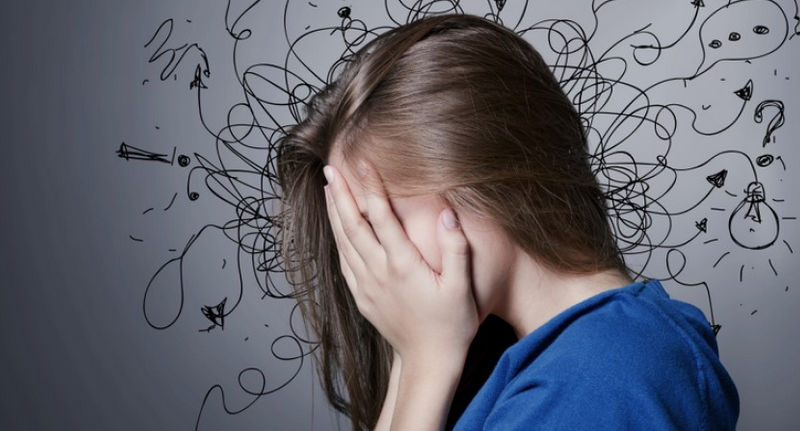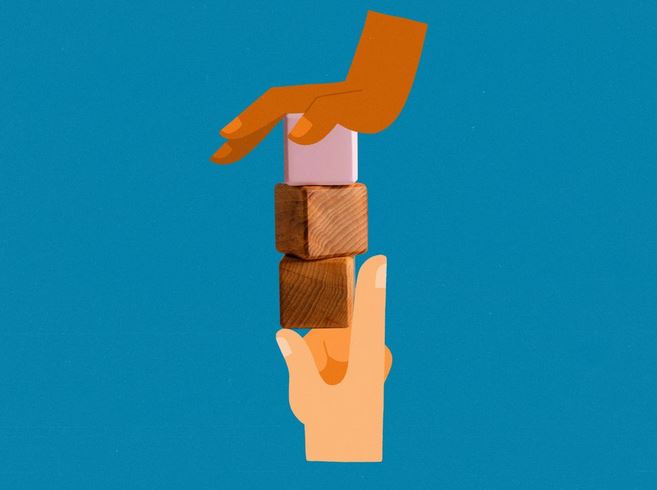ANXIETY DISORDERS – Symptoms, Causes, Types And Natural Remedies To Relieve Anxiety Symptoms
Having occasional anxiety and sometimes being worried or afraid is a totally normal part of life. However, individuals with anxiety disorders often experience extreme, intense, unnecessary, constant fear and worry about daily situations. These feelings are hard to control, are not in proportion to the real danger, and can persist for a long time.
Recurrent episodes of unexpected and immediate feelings of enormous fear, terror, and anxiety may reach to maximum within minutes and cause panic attacks.
These kinds of feelings interfere with everyday activities, and people with anxiety disorders may start to avoid certain situations or places to prevent these emotions.
Anxiety disorders are quite frequent these days, as even up to 33.7% of people are affected by some type of anxiety disorder during their lifetime. One person may have more than one anxiety disorder or anxiety disorder together with depression. Signs of anxiety disorders may begin in childhood or puberty and sustain into adulthood.
Here in this article, we write about the most common types of anxiety disorders, their causes, symptoms, risk groups, and also about natural treatment options for anxiety (19).
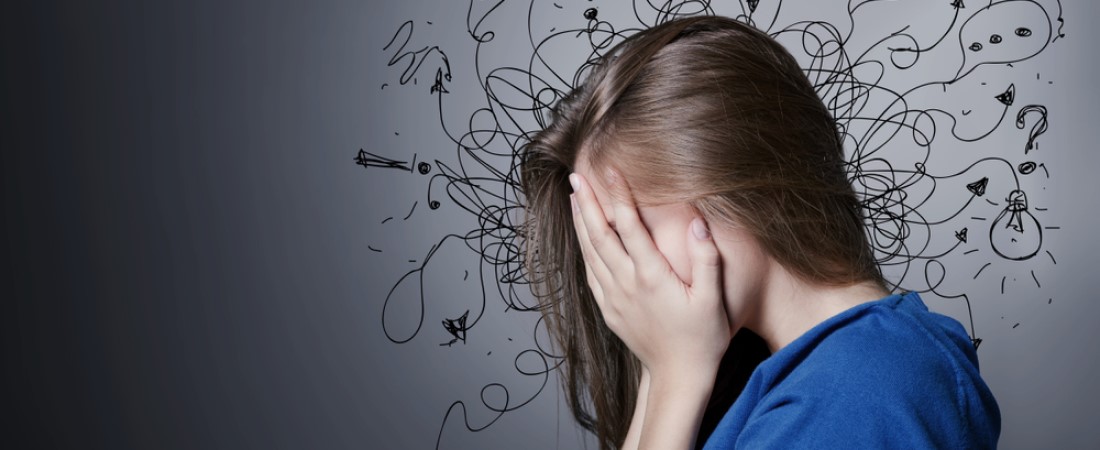
Anxiety Disorder Types
There are several types of anxiety disorders, such as:
1. Generalized Anxiety Disorder (GAD)
If you suffer from a generalized anxiety disorder, you may feel unrealistic and severe – even maximum worry and stress because of very tiny reasons or no reason at all. Things that cause you distress may include numerous issues, such as work, health, school, and relationships. It may also seem to you that the worry extends from one thing to the next. GAD can lead to changes in your thinking, your behavior, and the way you feel about something.
Symptoms you experience may even cause you to avoid social contact because you don’t want to have feelings of dread, stress, and worry that accompany the social activity. So you may find yourself making excuses to avoid these situations or taking time off from work. This kind of behavior may make you worry even more about yourself and escalate your lack of self-esteem.
Psychological and physical symptoms of a generalized anxiety disorder (GAD) may include for example:
- restlessness,
- a sense of dread,
- difficulty concentrating,
- insomnia (sleeping problems in which there are difficulties falling or staying asleep),
- feeling like you are constantly “on edge”,
- irritability,
- dizziness,
- tiredness,
- heart palpitations,
- muscle aches and tension,
- trembling or shaking,
- dry mouth,
- excessive sweating,
- shortness of breath,
- stomach ache,
- feeling sick,
- headache,
- in addition, pins and needles.
2. Panic Disorder
In the case of panic disorder, you may face sudden, unexpected, severe fear that leads to a panic attack. These attacks may be caused by some kind of trigger, like coming up against a situation you fear or for no reason at all. The feelings of terror and fear are more intense than in other types of anxiety disorders, and you may even feel like you are having a heart attack.
Psychological and physical symptoms of a panic attack may include for example:
- heart palpitations (heart is pounding),
- sweating,
- chest pain,
- shortness of breath,
- feeling of choking,
- feeling of heart attack,
- it may seem like you are “going crazy.”
- panic attacks are extremely disturbing, so individuals with this disorder often spend a lot of time worrying about possibly upcoming panic attacks,
- in addition, to avoiding situations that might trigger an attack.
3. Specific Phobias
In the case of a specific phobia, or a simple phobia, you may have an extreme fear of specific objects like spiders, or situations like flying, heights, or others. This type of intense fear may cause you to avoid even daily habitual situations and spend a lot of time trying to avoid situations that may trigger the phobia. Although some of these phobias may be justified (for example a fear of snakes), the level of fear often doesn’t match the situation.
Some specific phobias include fear of:
- blood,
- animals, such as snakes, dogs or spiders,
- blood,
- flying,
- heights,
- injections (shots).
4. Agoraphobia
An intensive worry of being in a specific place where it seems hard to leave or to get help if anything happens. Being overwhelmed and the feeling of intense fear or anxiety in certain situations may cause you to have a panic attack. The fear of having a panic attack in public may lead a person with this disorder to prefer to stay inside and not leave the house at all.
Usually, people with agoraphobia have a fear of two or more of these situations or environments such as:
- Flying on an airplane.
- Being in enclosed spaces such as an elevator.
- Standing in line or in crowded places.
- Driving public transportation
- Open spaces.
- Places outside your house.
5. Social Anxiety Disorder Or Social Phobia
In the case of social anxiety disorder, you may experience enormous worry and self-consciousness in everyday social situations. People with this type of anxiety disorder may start avoiding social situations completely.
For example, social settings may make you intensely concerned about:
- embarrassing yourself or opening yourself up to ridicule,
- others judging you,
- what others think of you.
6. Separation Anxiety Disorder
Although separation anxiety is something most children or teens have (who may be concerned about being away from their parents), it can happen to anyone, as it is quite a common disorder. Kids with a separation anxiety disorder may feel scared or anxious and fear that their parents will be hurt in some way or not come back as promised. You may also have the same emotions when you are already an adult, and someone close to you is not with you at this moment.
Separation anxiety symptoms in children may include, for example:
- Not willing to sleep alone.
- Recurrent nightmares which involve separation.
- Clinging to parents.
- Severe crying.
- Not willing to do things that involve separation.
- Too much worry when apart from family or home, about getting lost from family, or about the safety of a family member.
- Physical illness (vomiting or headaches).
- Emotional outbursts.
- Not willing to go to school.
- Unable to interact healthily with other children.
Separation anxiety symptoms in adults:
- Abnormal worry about being apart from a person or pet and extreme distress that another will be harmed somehow if left alone.
- Elevated fear and worry of being alone.
- The fear of being separated from another person soon may also cause physical symptoms.
7. Selective Mutism
Selective mutism commonly starts during childhood (between ages 2 and 4) and, if left untreated, can continue into adulthood. Usually, this type of social anxiety is first noticed when the child who talks and acts entirely normally with parents and family cannot speak in public and with people outside the family, for example in nursery or school.
People with selective mutism may avoid eye contact and seem for example:
- Shy
- Withdrawn.
- Socially awkward or uneasy.
- Nervous.
- Rude.
- Disinterested or sulky.
- Clingy.
- Tense, stiff.
- Poorly coordinated.
- Stubborn or aggressive.
- Having uncontrolled outbursts when they get home from school.
- Angry when questioned by parents.
8. Medication-Induced Anxiety Disorder
Some signs of anxiety can also be activated for instance if you are using illegal medications, or drugs, or in case withdraw from certain medication (1, 3, 4, 5, 6).
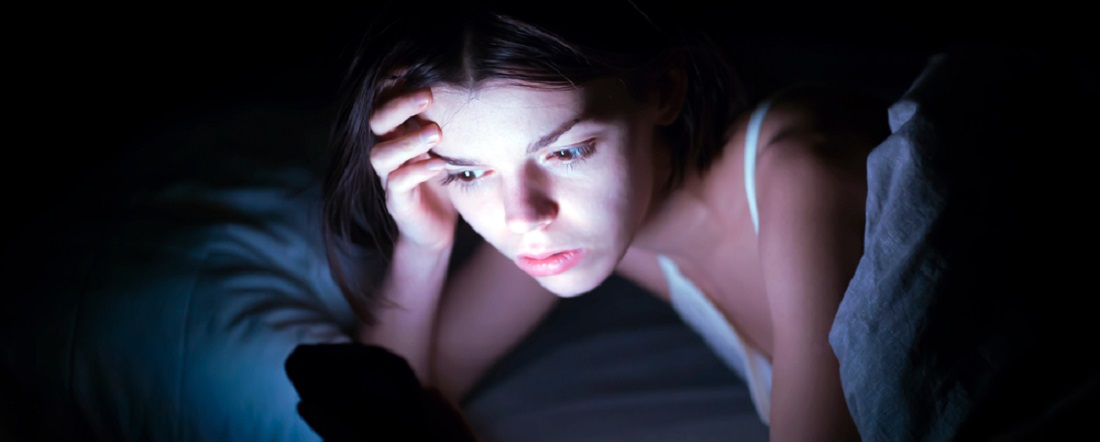
Anxiety Disorder Symptoms
The severity of the symptoms usually varies between people. Some individuals may experience only 1 or 2 symptoms, while others have numerous more. The precise symptoms of anxiety depend on the type of anxiety disorder you have. Though mostly all people with different anxiety disorders feel unnecessary, uncontrolled, and intense fear or worry.
Common psychological and physical symptoms of anxiety disorder are for example:
- Intensely thinking about some problem over and over again and being powerless to stop.
- Panic and fear.
- Uneasiness.
- Feeling restless, problems with staying still and being calm.
- Feeling tense and nervous.
- Difficulties in concentration.
- Feelings of danger or doom.
- Avoiding feared objects or places that trigger anxiety.
- Shortness of breath.
- Sweating.
- Feeling tired or weak.
- Dry mouth.
- Trembling.
- Problems with sleeping.
- Numb hands or feet.
- Cold or sweaty hands or feet.
- Tingling hands or feet.
- Breathing difficulties, for example, breathing more quickly and faster than normal (hyperventilation).
- Nausea.
- Dizziness.
- Muscle tension.
- Increased heart rate, heart palpitations (heart is pounding).
- In addition, gastrointestinal (GI) problems (1, 2, 7).
If anxiety is influencing your daily life or causing you distress you should see your GP.
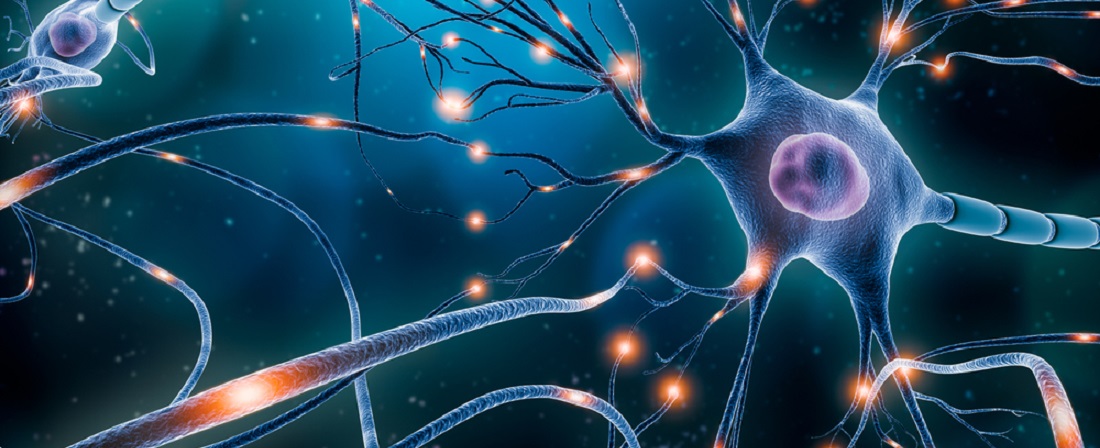
Anxiety Disorder Causes And Risk Factors
There are many things that can contribute to developing anxiety disorders, some of these include for example:
- Brain chemistry. It is possible that anxiety disorders are caused by wrong circuits in this area of the brain that controls emotions and fear.
- Mental health problems.
- Genetics. These types of disorders can be hereditary and run in families. So if your relatives have some type of anxiety disorder, it’s more likely you may have it too.
- Substance misuse or withdrawal.
- Medical conditions. If you suspect that you may have anxiety disorder consult your doctor to rule out some health conditions (several heart, lung, and thyroid conditions) that may cause signs similar to anxiety disorders or worsen anxiety symptoms.
- Low self-esteem.
- Shyness in childhood.
- Environmental stress (negative life events). Stressful life events you have seen or traumas you have lived through are often associated with anxiety disorders, include for example:
- death of a loved one, or losing a parent in early childhood,
- childhood abuse or neglect,
- being attacked,
- illness, as constantly worrying about your own health or the health of someone you love may cause anxious feelings,
- in addition, to seeing violence (1).
Anxiety Disorders Complications
In addition to making you worry too much, anxiety disorders (especially when neglected and left untreated) may also worsen or lead to other psychological or physical conditions, such as:
- Trouble sleeping (insomnia).
- Depression (often, one person may have both – anxiety disorder as well as depression) or other mental health disorders.
- Social separation and isolation.
- Problems performing at school or work.
- Poor quality of life.
- The misuse of alcohol, illegal drugs, or over-the-counter or prescription medications (substance misuse).
- Problems with the gastrointestinal (GI) tract or bowel.
- Chronic pain and headaches.
- Suicide (7).
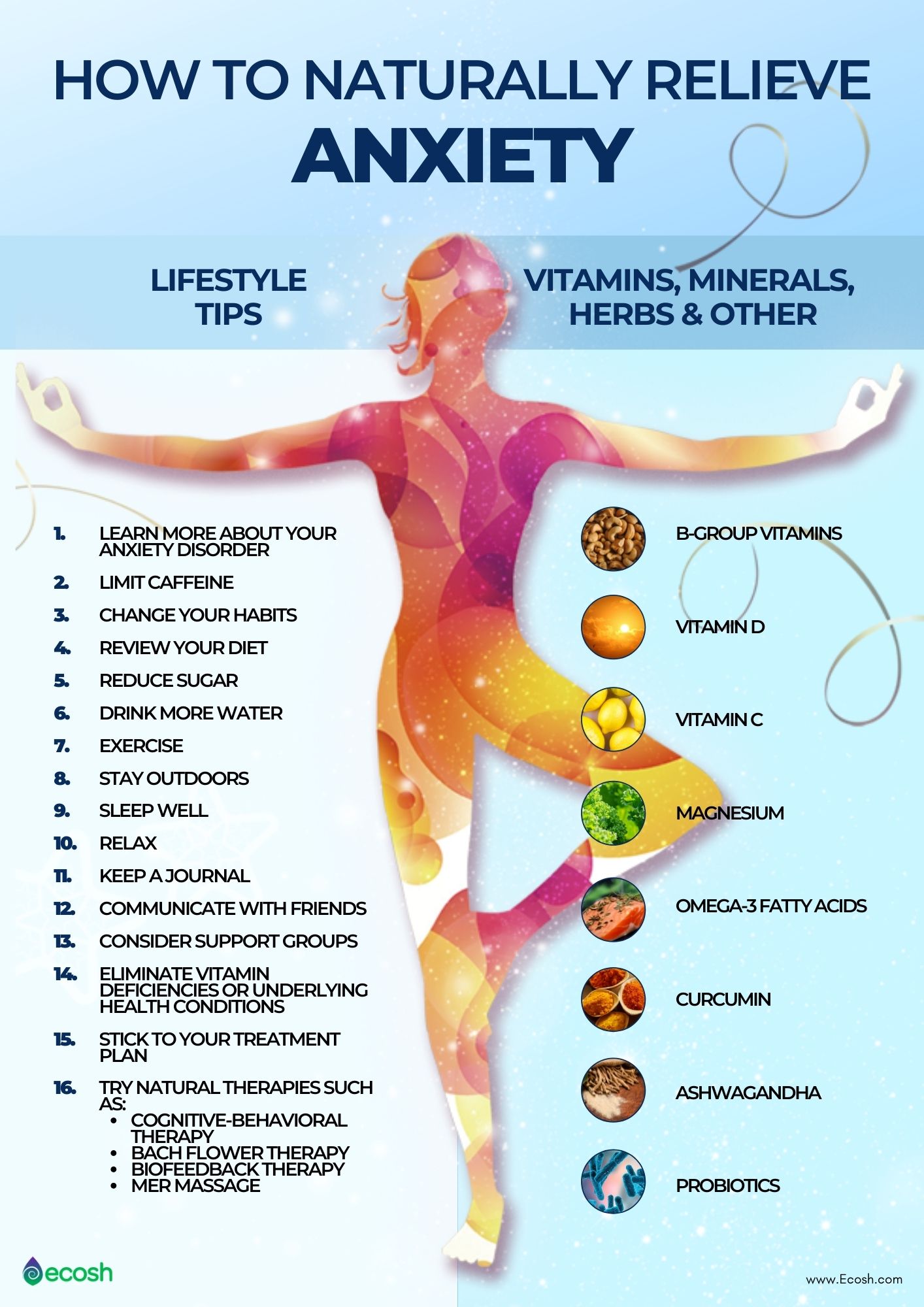
Anxiety Disorders Natural Treatment – Lifestyle Tips, Vitamins, Minerals, Herbs, And Other Supplements To Naturally Relieve Anxiety Disorder Symptoms
16 Lifestyle Tips To Control Or Decrease Your Anxiety Symptoms:
- Learn more about your anxiety disorder. The more you understand your disorder, the better you are prepared to manage your triggers, symptoms, and barriers along the way.
- Limit or avoid products with caffeine. Foods and drinks that contain caffeine, such as energy drinks, cola, coffee, tea, and chocolate may worsen your anxiety symptoms as caffeine is a mood-altering drug.
- Change your habits. For instance, reduce smoking and the consumption of alcohol. You should also avoid recreational street drugs and the misuse of medications, as substance abuse increases your likelihood of anxiety disorders.
- Review your diet. You may have food intolerances and food allergies. In the case of food intolerance, intolerable food is a poison to your body that also has harmful effects on your nervous system. For example, wheat, dairy, sugar, and meat products are mostly these foods that your body may not tolerate. In addition, as anxiety and digestion problems often go hand to hand (causing constipation in some people and diarrhea in others), you may find it helpful to consume more probiotic foods such as pickled vegetables, sauerkraut, sour milk made from raw milk, kefir, or use probiotics (lactic acid bacteria) as a dietary supplement, as acidified products may not provide the required amount of probiotic culture to cover the entire intestine with beneficial bacteria.
Beneficial lactic acid bacteria are responsible for protecting the intestinal wall, breaking down and grinding food, neutralizing harmful microbes, removing toxins and waste products, and maintaining both our mental and physical health.
- Reduce the consumption of sugar-containing products. Sugar causes acidification of your body which is a perfect environment for inflammation and various other serious diseases. Excess sugar also damages your nervous system.
- Consume more water. It is a known fact that a person is made up of 60-70% water. Without water, no process in the body can function, as water is one of the most important substances that absolutely every part of the body and cell needs to function.
- Exercise. Physical activity is the best way to release negative energies and brain chemicals that cut stress. Exercising helps produce the happiness hormone serotonin and improves your mood. It also burns the sugar in your body (calories), and burning sugar produces energy. Thus, the more movement and oxygen, the more mitochondria “cell power plants” are created in your body’s cells, which are responsible for producing energy.
- Stay outdoors in a reasonable amount of sunlight. Staying in nature, listening to the sounds of nature, feeling the scents of nature, the sunlight on the tops of trees, the feeling of sunshine on your skin – all of that can be very soothing and therapeutic if you give it a chance. In addition, anxiety is also associated with vitamin D deficiency, and the best source of vitamin D is the sun! Just don’t overdo it, 10-30 minutes of sunlight every day is enough to synthesize vitamin D in your body.
- Sleep well. Anxiety disorder and sleeping problems often go hand in hand, so getting better sleep is extremely important.
- Relax. Managing your negative thoughts and stress is a vital part of the treatment of your anxiety disorder.
For example, practicing yoga, meditation, visualization techniques, or mindfulness, can help you relax after a tense day and contribute to your treatment plan.
- Keep a journal. One more thing that may make you ease up and clear your mind after a demanding day is writing down your thoughts before the day ends. This procedure may also help you sleep better and not worry about your problems all night long. Or, list your tasks if the work overload is causing your anxiety. Remember when writing your to-do list – Rome was not built in a day. So be easy on yourself, and diffuse your tasks over a week or over a month. When completing your tasks, it’s important to focus on only what you’re doing now and not think about the next second task or the full to-do list.
- Communicate with your friends. It’s not important how you communicate (on the phone, on the computer, or in person), as long as you communicate. Being social helps you stay healthy, and those with close friends who support and chat with them have lower levels of social anxiety.
- Consider support groups. In some cases, people find it encouraging and helpful to communicate with others who have the same obstacles, symptoms, and feelings.
For example, talking with people who have been there – may help you find solutions not written anywhere else.
- Consult your doctor. Even if you decide to combat your anxiety disorder without taking anti-anxiety medications or antidepressants, only your doctor can help you with some things. Firstly, ruling out the deficiency of nutrients, and secondly, ruling out other underlying health conditions which may cause anxiety.
To rule out nutrient deficiencies and possible underlying causes ask your doctor to take blood and other necessary tests.
-
- Take a blood test. If possible, have your levels of vitamins, minerals, fats, and amino acids measured. Lack of micro-and macro-nutrients causes anxiety in your body because your body simply does not have the building blocks to keep itself functioning and build healthy new cells. For example, brain cells are made up of a lot of fat, and if a person does not eat healthy fats such as fish oil, olive oil, hemp oil, and walnut oil (omega 3, 6, 9 fatty acids), the brain simply panics because it lacks an essential substance for its function. Lack of magnesium and B vitamins, in turn, causes disorders of the nervous system and may lead to anxiety, irritability, and so on.
- Ask your doctor to test your thyroid gland (eg, Hashimoto’s thyroiditis), anemia (lack of vitamin C and iron), candidiasis, and dysbacteriosis caused by the yeast Candida albicans to rule out any illness that may also cause tiredness, sleep problems, anxiety disorders, and depression.
- Stick to your treatment plan. For example, if you are taking medication for the treatment of some mental or physical condition, do not suddenly stop, as stopping your prescribed medications can lead to unwanted side effects and trigger anxiety symptoms.
- Natural therapies. If necessary, go to a psychologist or therapist to help decode and release internal traumas and fears and manage negative thoughts. You can also try other therapeutic practices and methods that relieve old traumas and tension that have accumulated in your body, such as:
- Cognitive-behavioral therapy. This therapy can help you manage and redirect the negative and stressful thoughts that cause you anxiety.
- Bach flower therapy,
- Biofeedback therapy,
- MER massage (Myofascial Energetic Release) or deep connective tissue and muscle massage.
If your depression has developed into very serious symptoms, have your doctor prescribe antidepressants as they will help you to control the situation for a while and give you time to look for other, longer-lasting solutions (1).
Here Are a Few Additional Suggestions That May Also Help Relieve Your Anxiety
Find one thought that comforts you or simple activity that relieves stress
Yes, any thought can elevate your anxiety in the case of a severe anxiety disorder. No matter how much you try to think of something positive that should ideally calm you down – every thought still causes a lump in your throat, heaviness in your chest, or tension in your head.
But you should know the thought that will alleviate your anxiety exists; you just have to find it. It doesn’t have to be an idealistic idea like the caress of a soft breeze on the beach of your dreams or enjoying the warm sun, but it can be a completely trivial daily thing.
For example, if you’re planning to make soup for dinner – think about cutting carrot cubes in a different shape this time. Maybe this time, the carrot could be cut into small flowers. Would that be possible at all? Try it – and you’ll notice that the moment you carve the small flowers out of the carrot, there is a vacation in your head.
But, don’t despair if you don’t come up with some calming thought or activity right away. You will soon. Or maybe is it a certain melody or the words of some song that takes your thoughts elsewhere for a moment?
Do 1 thing every day for your health.
One is enough! The one thing for your health can be a 15-minute walk, one particular favorite yoga exercise, or a vitamin under your tongue – whatever it is – it helps.
Finally, say it or do it.
Words that you would like to say to someone or actions that you are constantly postponing can also cause tension and anxiety. If these words or undone things have settled and taken up space in your head for so long that they are already causing anxiety, now is the time to collect your courage and willpower to finally say the words or do these unpleasant activities.
Anxiety disorders can be caused by overwork, so reduce your overload
Your workload and the list of tasks needed to be done are not too long for no reason. It seems that you are the type of person who knows you can manage it all and deliberately takes too many problems to solve and goals to achieve. And you will definitely manage with the long list of things to do. For sure.
But, the overload can get you off the road for a while, and anxiety often signals just that. Just as a computer can crash due to processing too many tasks at once, so does the human brain. It is your brain’s self-defense. And it is a good thing.
Now all you have to do is pull the wire out for a while, give yourself some time, gather strength, and reconnect to start again with small steps. Wise people do not rush.

Vitamins, Minerals, Herbs, and Other Supplements For Anxiety
All the vitamins, minerals, or other nutrients listed below are involved in the functioning of your nervous system. The absence of these substances may lead to nervous system disorders and damage.
- B vitamins. Vitamin B12 and other B vitamins play a role in the production of brain chemicals that affect mood and other brain functions. Therefore, low levels of vitamin B12 and other B vitamins such as vitamin B6 and folate may be associated with the development of anxiety as well as depression (15).
- Vitamin D. Researchers have found that people who suffer from various psychiatric disorders, including anxiety disorders often have low levels of vitamin D. Thus, being in the sun (within reason, of course) or taking vitamin D supplements may help relieve the symptoms of mild anxiety (9, 10).
- Magnesium Glycinate. Magnesium is one of the most important minerals in the human body, as it is involved in brain biochemistry and neuronal membrane fluidity. A variety of neuromuscular and psychiatric symptoms have been reported in individuals with magnesium deficiency, including various types of depression and anxiety.
However, taking magnesium supplements may help, as for instance, one study found that taking 248 mg of elemental magnesium per day leads to a remarkable decrease in depression and anxiety symptoms regardless of gender and age (8).
- Omega-3 Fatty Acids. Omega-3 polyunsaturated fatty acids are essential nutrients that have potential preventive and therapeutic effects on psychiatric disorders such as anxiety and depression. Many trials have found that omega-3 fatty acids may lessen anxiety under severe stressful situations (11).
- Vitamin C. Vitamin C is considered to be a vital antioxidant element in your brain. By maintaining the function of numerous processes in your central nervous system, vitamin C plays an important therapeutic role in anxiety (13, 14).
- Curcumin. Curcumin has gained worldwide recognition for its multiple health benefits, which seem to act mainly through its anti-inflammatory and antioxidant mechanisms. These health benefits are best achieved when curcumin is combined with other agents, such as piperine, which remarkably elevates its bioavailability. Research suggests that curcumin may also help in the management of oxidative and inflammatory conditions, metabolic syndrome, arthritis, as well as anxiety (17).
- Ashwagandha. Scientific studies show that Ashwagandha contains many different essential compounds that act as building blocks for hormones in the body. These compounds also act as natural antidepressants and fight against anxiety and inflammation in your body (12).
- Probiotics. Digestive problems often accompany anxiety because constant worry and anxiety can upset the fragile balance of your digestion. In some people, stress speeds up digestion, leading to diarrhea and frequent trips to the loo, while in others, it slows it down, causing bloating, pain, and constipation. Therefore, it’s important to gain back the microbial balance in your intestines. However, if you do not eat enough probiotic foods – probiotic supplements may help you as well. Research suggests that probiotics may be a great additional treatment for mood or emotional disorders as they can reduce depressive symptoms in people with a depression diagnosis or depression scores also in anxiety disorder diagnosis (18).
Consult your doctor before taking any OTC medications or herbal remedies, because numerous of them have chemicals inside that may worsen anxiety symptoms.
NB! The information provided here is for informational purposes only, so do not consider it as health care or medical diagnosis and treatment. Do not consider this information as a guarantee of the results you want to achieve. In addition, do not take this information as a replacement for the advice of your physician or other healthcare professional.
Even more, you should not use it to diagnose or treat a health problem. Before changing or discontinuing your existing medication, treatment, or care, or taking any dietary supplements, be sure to consult with your healthcare professional or doctor before starting any diet or program, or if you suspect you may have a medical condition.
Source: https://ecosh.com/anxiety-disorders-symptoms-causes-types-and-natural-remedies-to-relieve-anxiety-symptoms/

